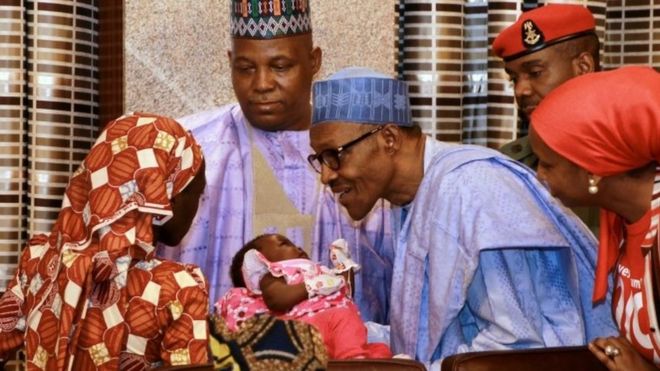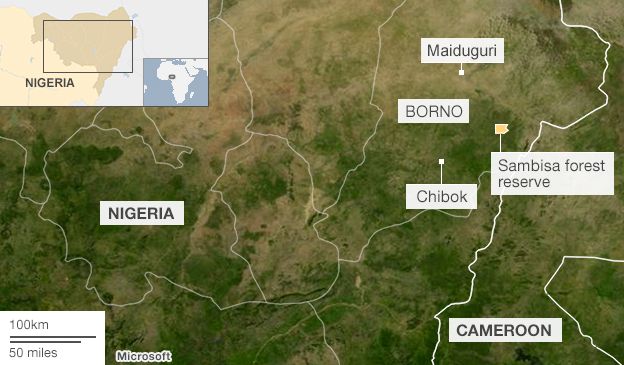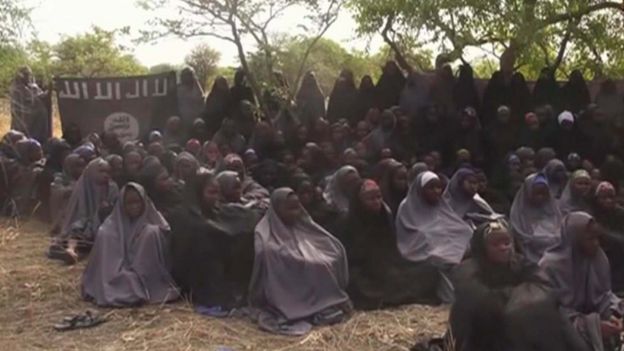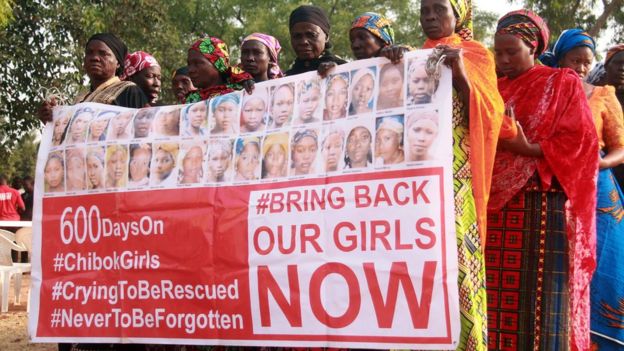- 2 hours ago
- Africa
 REUTERS
REUTERS
The first of the missing Nigerian schoolgirls to be rescued from Boko Haram militants has met President Muhammadu Buhari at his villa in Abuja.
Amina Ali Nkeki, 19, was found with a baby by an army-backed vigilante group on Tuesday in the huge Sambisa Forest, close to the border with Cameroon.
She was one of 219 pupils missing since being abducted from a secondary school in the town of Chibok in April 2014.
Mr Buhari said he was delighted she was back and could resume her education.
"But my feelings are tinged with deep sadness at the horrors the young girl has had to go through at such an early stage in her life," he said in a statement published on Facebook.
"Although we cannot do anything to reverse the horrors of her past, federal government can and will do everything possible to ensure that the rest of her life takes a completely different course.
"Amina will receive the best care that the Nigerian government can afford. We will ensure that she gets the best medical, psychological, emotional and whatever other care she requires to make a full recovery and be reintegrated fully into society."
Continuation of her education "will definitely be a priority of the federal government", the president said.
After her escape from Boko Haram, Ms Nkeki had an emotional reunion with her mother.
On Wednesday the 19 year old and her four-month-old baby were flown by the Nigerian Air Force to Maiduguri - the capital of Borno state - before going on to Abuja the following day by presidential jet.
She had been held captive for more than two years by militants fighting to establish an Islamic state.
Ms Nkeki was reportedly recognised by a fighter of the civilian Joint Task Force (JTF), who was on patrol as part of a vigilante group set up to fight Boko Haram.
She was with a suspected Boko Haram fighter who is now in the Nigerian military's custody. Named as Mohammed Hayatu, he said he was Ms Nkeki's husband.
More on the Chibok abductions:

Hosea Abana Tsambido, the chairman of the Chibok community in Abuja, told the BBC that Ms Nkeki had been found while searching for firewood in the forest area surrounding the Boko Haram settlement.
"She was saying… all the Chibok girls are still there in the Sambisa except six of them that have already died."
During the April 2014 attack, Boko Haram gunmen arrived in Chibok at night and raided the school dormitories, loading 276 girls on to trucks.
More than 50 managed to escape within hours, mostly by jumping off the lorries and running off into roadside bushes.
A video broadcast by CNN in April this year appeared to show some of the kidnapped schoolgirls alive.
Fifteen girls in black robes were pictured. They said they were being treated well but wanted to be with their families.
The video was allegedly shot on Christmas Day 2015 and some of the girls were identified by their parents.
The Chibok schoolgirls, many of whom are Christian, had previously not been seen since May 2014, when Boko Haram released a video of about 130 of them gathered together reciting the Koran.
The abduction led to the #BringBackOurGirls campaign, which was supported by US First Lady Michelle Obama and Pakistani activist Malala Yousafzai.
 AP
AP AFP
AFP
Another campaign group working for the girls' release, the Pathfinders Justice Initiative, said there was a "renewed sense of energy and hope and excitement" among families of the girls after Ms Nkeki's escape.
Executive director Evon Idahosa told the BBC World Service's Newsday programme that there was now "no excuse" for the Nigerian government not to step up efforts to free the remaining captives.
"They [the families] are excited but they have also been disappointed so much in the past, particularly during the Jonathan administration [from 2010-2015]."
Boko Haram at a glance:
- Founded in 2002, initially focused on opposing Western-style education - Boko Haram means "Western education is forbidden" in the Hausa language
- Launched military operations in 2009
- Thousands killed, mostly in north-eastern Nigeria, and hundreds abducted
- Joined so-called Islamic State, now calls itself IS's "West African province"
- Seized large area in north-east, where it declared caliphate
- Regional force has now retaken most of that territory

No comments:
Post a Comment